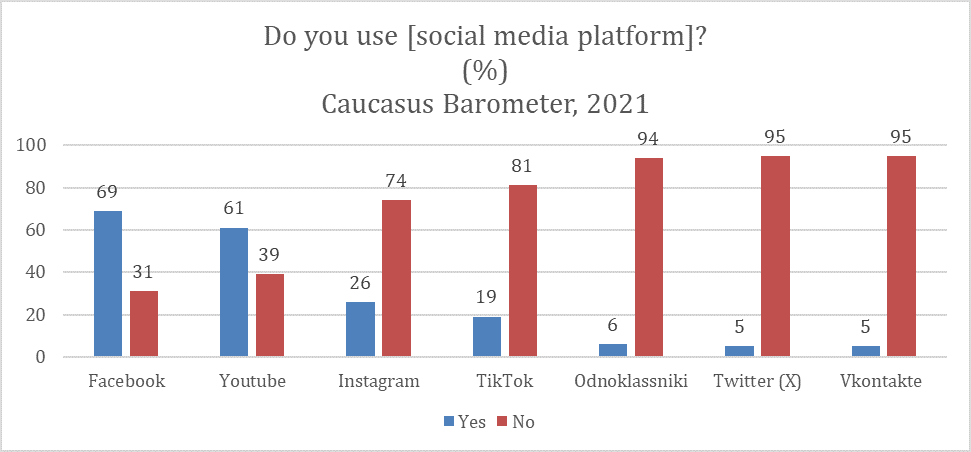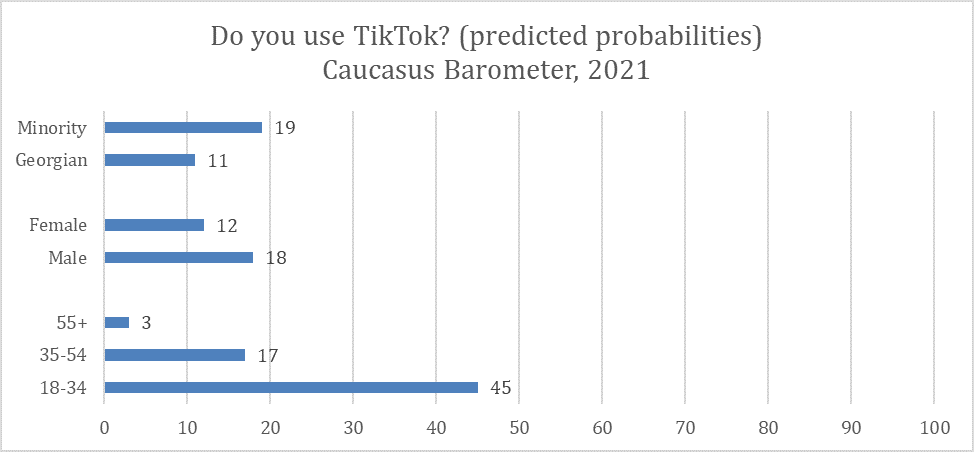
A CRRC analysis of Georgian social media use has found that while Facebook remains the most popular social network in the country, almost half of young Georgians are on TikTok, with men and members of ethnic minority groups more likely to use the app.
Despite being a relative newcomer to the social media market, the popularity of TikTok, the short-form video sharing platform, is rapidly growing as a tool for accessing and engaging in entertainment and niche communities, especially among young people. This has remained the case despite controversies relating to data-sharing and state security, as its founding company, ByteDance, is China-based and has ties to China’s government.
Data from the 2021 Caucasus Barometer survey shows that while TikTok is used by far fewer people than Facebook in Georgia, nearly half of young people were using the platform as of late 2021.
Georgia’s most popular social media site by far is Facebook, with 69% of the population using the site, according to Caucasus Barometer 2021 data. Following Facebook in popularity are YouTube (61%), Instagram (26%), and TikTok (19%). Other platforms asked about included Twitter (now X) (5%), Vkontakte (5%), and Odnoklassniki (6%), which were significantly less popular.

Who uses TikTok?
The data suggests that usage is concentrated among young people. Controlling for other factors, the youngest group of adults surveyed are 42 percentage points — 15 times — more likely to use TikTok than older people. While only 19% of the public use TikTok, a regression analysis suggests that young people (18-34-year-olds) have a 45% chance of using the platform, controlling for other factors. This compares to only a 3% chance among those 55 and older, and a 17% chance among those aged 35-54. The Caucasus Barometer only surveys adults, meaning that data for those under 18 is not available.
Aside from age, several other factors predict TikTok usage.
Ethnic minorities are eight points more likely to use the platform than ethnic Georgians, while men are six points more likely than women to report engaging with the site.
Where one lives, level of education, employment status, and wealth were not associated with whether someone used the platform.

Interestingly, partisanship is also associated with TikTok use. Those who supported any party were more likely to use TikTok than those who refused to answer which party they supported, did not know which party they supported, or did not support any party.

Despite Facebook’s continued dominance of the social media market in Georgia, both the above and other Caucasus Barometer data suggest 18-34-year-olds appear to be open to engaging with and using new platforms.
While the exact impact that it has remains to be seen, TikTok’s rapid rise in popularity among nearly half of the youngest adult demographic will likely have implications for Georgia’s relationship to entertainment, news, politics, and security.
This article was written by Zachary Fabos, a Researcher at CRRC Georgia. The views presented in the article are the author’s alone and do not necessarily represent the views of CRRC Georgia or any related entity.
Note: The analysis in this article makes use of logistic regression analysis. The analysis included gender (male, female), age group (18-34, 35-54, and 55+), settlement type (capital, urban, rural), education (secondary/ secondary technical/ lower, and tertiary), ethnicity (ethnic Georgian, ethnic minority), employment (not employed, employed), a wealth index (0-10), and party (no party/don’t know, other party, refuse to answer, Georgian Dream, UNM) as predictor variables.
The data used in this article is available here.








